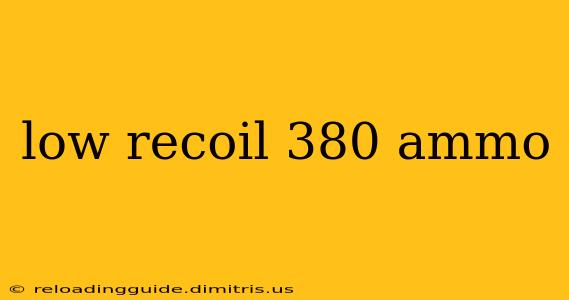Finding the right ammunition can significantly impact your shooting experience, especially for those new to firearms or those seeking a more comfortable shooting session. For .380 ACP users, managing recoil is a key concern. This guide explores low-recoil .380 ammo options and what makes them ideal for various applications.
Understanding Recoil in .380 ACP
Before diving into specific ammunition, it's crucial to understand what contributes to recoil. Recoil is the backward force felt by the shooter after a firearm discharges. In .380 ACP, several factors influence recoil intensity:
-
Bullet Weight: Lighter bullets generally produce less recoil than heavier ones. This is because the lighter bullet has less momentum leaving the barrel.
-
Powder Charge: The amount of propellant used directly impacts the force of the explosion, influencing the velocity of the bullet and, consequently, the recoil. Lower powder charges translate to less recoil.
-
Barrel Length: Shorter barrels generally experience slightly more recoil than longer barrels due to the shorter time the expanding gases are pushing the bullet.
Top Choices for Low-Recoil .380 Ammo
Several manufacturers produce .380 ACP ammunition specifically designed for reduced recoil. While the "best" option depends on individual preferences and intended use (self-defense, target practice, etc.), some consistently rank highly for their low recoil profiles:
Note: Specific product availability and pricing can vary significantly depending on your location and retailer. Always check current offerings at your preferred firearms dealer.
Ammunition focusing on lighter bullet weight:
- .380 ACP with 90-grain bullets: Many manufacturers offer rounds with bullets in this weight range. These are frequently advertised as "low-recoil" options, and their lighter weight contributes to a gentler shooting experience.
Ammunition focusing on reduced powder charges:
- Target Ammunition: Many brands offer target ammunition specifically designed for practice. These loads often prioritize accuracy and reduced recoil over maximum stopping power. Look for descriptions highlighting "reduced recoil" or "target grade."
Factors to Consider Beyond Recoil
While low recoil is a significant advantage, other factors should influence your ammo selection:
-
Accuracy: Even low-recoil ammo should provide acceptable accuracy for its intended use. Test different brands to find what shoots best in your firearm.
-
Reliability: Choose ammunition known for reliable performance. Malfunctions can be dangerous, so using quality ammunition is crucial.
-
Self-Defense Considerations: If purchasing for self-defense, consider expanding bullets designed to inflict greater stopping power, even if they produce slightly more recoil. This is a critical point to research thoroughly and consider expert advice.
-
Your Firearm: The characteristics of your specific .380 ACP pistol can influence the perceived recoil. A heavier pistol will generally absorb recoil better than a lightweight one.
Finding the Right Low Recoil .380 Ammo for You
The process of selecting the right ammunition is largely a matter of trial and error. Start by researching options from reputable manufacturers, focusing on those specifically advertised as low-recoil. Then, test several different brands and bullet weights at your local range to find what feels most comfortable and provides acceptable accuracy for your needs. Remember to always follow safe gun handling practices. Consulting with experienced shooters or firearms instructors can also provide invaluable guidance.

